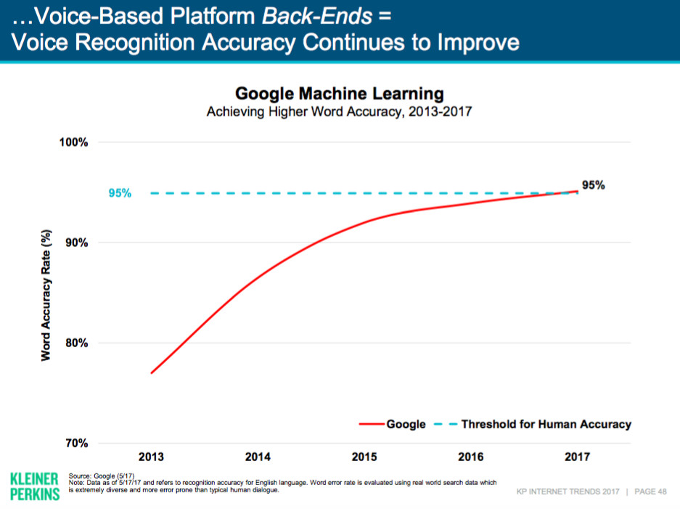Google's Voice Recognition Accuracy Grew 20 Percent in 4 Years, Notes Meeker
Advertisement
Highlights
- Google’s voice recognition has an accuracy of 95 percent
- This is nearly at par with human understanding
- Understanding of English has improved by 20 percent over four years

Google over the past year has been focusing greatly on its artificial intelligence and machine learning technology as it tries to push its voice-based Assistant service widely and across products. At Google I/O 2017, CEO Sundar Pichai opened the keynote by claiming that the company's voice recognition software has an error rate of under 5 percent. A recent report further highlights Google data to reveal how this accuracy has grown over the years.
The Internet search giant has come a long way in machine learning and its understanding human language has improving by an impressive 20 percent in the last four years, according to the Internet Trends 2017 report by Kleiner Perkins Caufield & Byers partner Mary Meeker.

Photo Credit: Mary Meeker
Google's stats are particularly impressive when taking into account that its voice recognition accuracy is now nearly at par with that of human accuracy. And Google has made it clear that it doesn't wish to stop there. Google Assistant has been a success story for that company as being one of the very few AI voice-based digital assistants out there that can understand contextual speech. The company has expanded Assistant's capability and reach over the past year, which can now be found in Google's Home speaker, Android smartphones like Pixel and Galaxy S8, messaging app Allo, Android Wear 2.0, and now more interestingly, the iPhone.
Advertisement
Recently, Assistant got some more improvements such as the ability to schedule appointments and add reminders through Google Home, make hands-free calls with Home, and see visual responses from Assistant on your TV through Chromecast. Google's voice recognition software also allows it to detect various accents better than its competitors like Apple's Siri and Amazon's Alexa.
For the latest tech news and reviews, follow Gadgets 360 on X, Facebook, WhatsApp, Threads and Google News. For the latest videos on gadgets and tech, subscribe to our YouTube channel. If you want to know everything about top influencers, follow our in-house Who'sThat360 on Instagram and YouTube.
Further reading:
Google, Google Voice Recognition, Machine Learning, Google Assistant, AI, Artificial Intelligence, Mary Meeker, Internet, Apps
Advertisement
